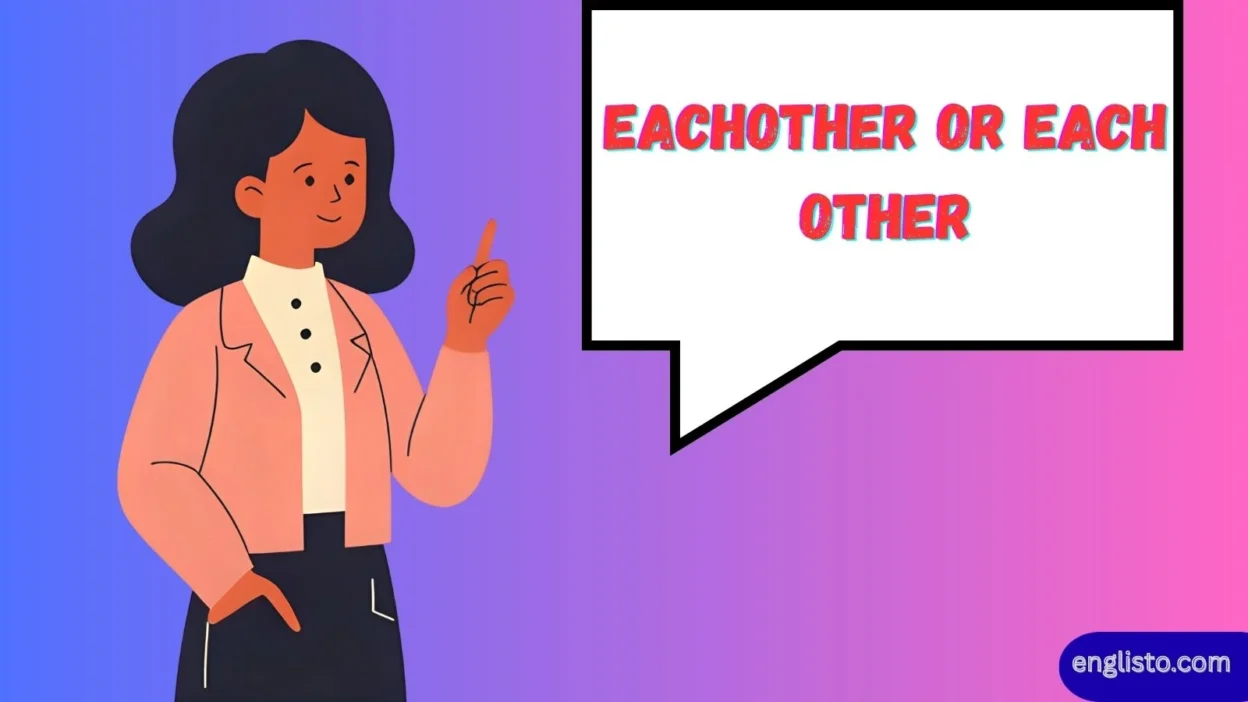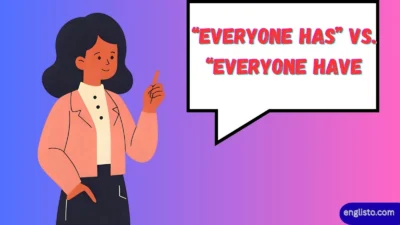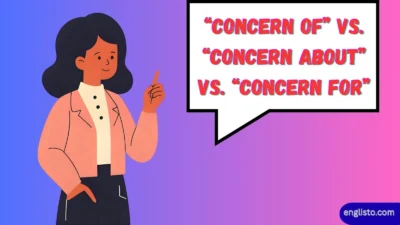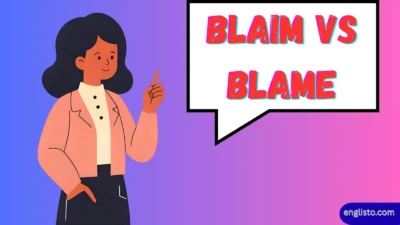When it comes to English spelling, even native speakers sometimes stumble over simple phrases. One such confusion arises with “each other” versus “eachother.” If you’ve ever hesitated while writing an email, essay, or social media post and wondered whether the correct spelling is one word or two, you’re not alone. The phrase is frequently misspelled, and yet the answer is surprisingly straightforward: Eachother or Each Other.
The correct spelling is “each other,” written as two separate words—never as one word.
Still, questions remain: Why is this the case? How did this confusion start? Is there ever a situation where “eachother” could be acceptable? This guide explores these questions in depth. We’ll look at grammar rules, dictionary evidence, usage examples, historical notes, and even a few tricks to help you remember the difference. By the end, you’ll not only know the right form but also understand why it matters in clear and effective communication.
What Does “Each Other” Mean?
At its core, “each other” is a reciprocal pronoun. That means it expresses an action, feeling, or relationship shared between two or more individuals.
- Reciprocal action: Two people or groups acting in response to one another.
- Reciprocal relationship: A bond or connection that goes both ways.
Examples:
- Paul and Jane looked across the room and smiled at each other.
- The siblings hugged each other tightly.
- Our colleagues congratulated each other on their achievements.
Here, “each other” implies mutuality. It signals that the action isn’t one-sided but involves both parties equally.
Read More: Is It Correct to Say “How Can We Help You?”
Why “Eachother” Is Incorrect
It might feel natural to fuse the words together—after all, when spoken quickly, each other blends smoothly. But in English grammar, this fusion is a mistake.
- Correct: each other
- Incorrect: eachother
Every major dictionary, from Cambridge to Webster’s and the OED (Oxford English Dictionary), lists “each other” as two words. No credible grammar authority accepts “eachother” as standard.
Some learners assume “eachother” is valid because English sometimes allows words to evolve into compounds (e.g., everyday vs. every day). But in this case, the transition never officially occurred.
Common Mistakes and Confusions
Spoken vs. Written English
In casual conversation, “each other” is pronounced quickly, which may create the illusion of a single word. Writing, however, demands precision—there’s no excuse for compressing the space.
Hyphen Misuse
Another mistake is to write “each-other” with a hyphen. This is also wrong. English doesn’t treat this phrase as a compound adjective.
- The team members supported each-other.
- The team members supported each other.
Misunderstanding Reciprocal Pronouns
Some learners confuse “each other” with “one another.” While both express reciprocity, “each other” is generally used for two people, while “one another” is broader, often used for more than two.
| Phrase | Typical Use Case | Example |
| Each other | Two individuals | John and Mary respect each other |
| One another | More than two | The classmates helped one another |
(Note: In modern English, this distinction is often blurred, and many speakers use them interchangeably.)
A Historical Glimpse: Why the Confusion Exists
The confusion surrounding “each other” is not new. Historical texts and early dictionaries occasionally recorded misspellings or experimental forms.
- In 1814, sporadic examples of “eachother” appeared in print.
- Data from COCA (Corpus of Contemporary American English) and COHA (Corpus of Historical American English) show rare but scattered use of the fused form.
However, statistical evidence is clear: the standard, recognized form remains “each other.”
Interestingly, in other languages like Dutch, the equivalent phrase is “elkaar” (one word). This may influence non-native speakers into mistakenly fusing “each other” in English.
Grammar Role of “Each Other”
To use “each other” correctly, it’s important to understand its grammatical role.
- Part of speech: Reciprocal pronoun (similar to one another).
- Function: Acts as the object of a verb or preposition.
Examples in sentences:
- The cats chased each other around the yard. (object of the verb chased)
- She and her friend apologized to each other. (object of the preposition to)
Singular or Plural?
“Each” is grammatically singular, but “each other” refers to two or more persons acting mutually. Therefore, the verb form usually depends on the actual subject of the sentence, not the phrase itself.
- The couple is supporting each other.
- The team members are supporting each other.
Synonyms and Alternatives
Sometimes, varying your phrasing keeps writing lively. While “each other” is the most direct choice, you can also use synonyms or rephrased expressions.
| Alternative Expression | Example |
| one another | The neighbors waved to one another |
| mutually | They mutually agreed on the plan |
| reciprocally | The friends helped reciprocally |
| together | The partners worked together |
Keep in mind: these words don’t always fit perfectly in place of “each other,” but they help avoid repetition.
Real-Life Usage Examples
Let’s see “each other” in contexts that feel natural and relatable:
- Lana and Christy are fond of each other.
- Coworkers should respect each other to maintain a healthy office environment.
- Friends who love each other remain united through thick and thin.
- At the picnic, family members laughed and enjoyed each other’s company.
- Birds were singing at dawn, answering each other in unison.
Notice how the phrase often appears in stories of relationships, feelings, and interactions.
How to Remember the Correct Spelling
Here are a few simple tricks:
- Think of space as care. Just as two people need space in a relationship, the words “each” and “other” need a little space between them.
- Grammar box technique: Write the phrase in a box: [each] [other]. If you merge them, the meaning gets blurred.
- Analogy trick: Just like one another is written as two words, so is each other.
Quick Reference Table
| Feature | Correct Form | Incorrect Form |
| Standard spelling | each other | eachother / each-other |
| Part of speech | Pronoun (reciprocal) | — |
| Dictionary record | Yes (all major dictionaries) | No |
| Accepted in grammar | Yes | No |
| Spoken form | Blended but still two words | — |
Conclusion
The bottom line is simple: Always write “each other” as two separate words.
It’s never fused into “eachother,” nor does it require a hyphen. The phrase is a reciprocal pronoun that expresses shared actions, feelings, and relationships between individuals or groups.
Remember: clarity in writing builds credibility. Choosing the correct spelling might seem like a small detail, but it strengthens your message and ensures you communicate effectively.
FAQs
Q1. Is “eachother” ever correct?
No. “Eachother” is a misspelling and is not recognized in English dictionaries or grammar references.
Q2. What’s the difference between “each other” and “one another”?
Traditionally, “each other” referred to two people, while “one another” referred to more than two. In modern usage, the distinction is often ignored.
Q3. Can I use “each other’s” with an apostrophe?
Yes, when showing possession. Example: We enjoyed each other’s company.
Q4. Why do people mistakenly write “eachother”?
Because in spoken English, the phrase sounds blended, and in some languages, the equivalent is written as a single word.
Q5. How can learners avoid this mistake?
Practice by writing example sentences, use grammar exercises, and remember that “each” and “other” always remain separate words.



